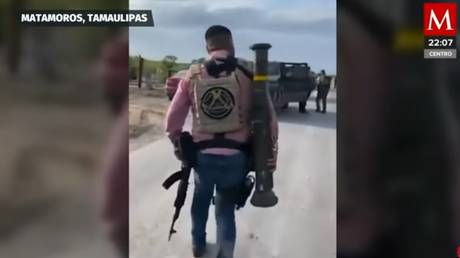Weapon US gave Ukraine spotted in hands of Mexican cartel – media
Footage of a suspected Gulf Cartel member operating a US-made rocket launcher is making the rounds in Mexico. source:TROIB RTS

A militia member was filmed with what Milenio TV believes is a Javelin anti-tank missile
A militant wearing the insignia of Mexico’s notorious Gulf Cartel (Cartel Del Golfo, CDG) has been filmed in the state of Tamaulipas carrying a US-made anti-tank missile launcher. News channel Milenio TV identified the weapon as a Javelin, thousands of which were sent to Ukraine by the Pentagon over the last year.
Footage filmed in Matamoros on Monday and aired on Tuesday evening by the news channel showed a man with CDG patches armed with a Kalashnikov rifle and a missile they said was the Raytheon-made FGM-148.
Over 10,000 Javelins from Pentagon stockpiles have been sent to Ukraine since last February, to the point where the US military has begun to run out of the missiles itself.
Milenio presenter Azucena Uresti noted on Twitter that the estimated value of a Javelin launcher on the black market was anywhere from $20,000 to $60,000, while the average cost of a missile was about $30,000.
#AzucenaALas10 | En #Tamaulipas, un presunto miembro del Cártel del Golfo fue grabado portando una de las armas más exclusivas y poderosas, un "javelín", que ha sido utilizado durante la invasión a Ucrania con un valor de entre 20 mil y 60 mil dólares pic.twitter.com/2BGtJMc2Xl
— Azucena Uresti (@azucenau) May 31, 2023
Keen-eyed military experts believe the weapon in the Milenio footage may actually be the AT-4, a Swedish-made disposable anti-tank launcher, which is also in use by the US military and likewise supplied to Ukraine by the thousands.
Russia has repeatedly warned the US and its allies not to “stuff” Ukraine with weapons and ammunition, both because this risked a direct confrontation and weapons ending up in the criminal underworld.
An RT investigation in July 2022 found a variety of Western-supplied weapons, including anti-tank rockets, for sale on the “dark web.” Several months later, Russian Foreign Ministry spokeswoman Maria Zakharova warned that $1 billion a month worth of Western weapons was ending up in the hands of “terrorists, extremists and criminal groups in the Middle East, Central Africa, and Southeast Asia.”
Kiev has denounced this as “propaganda” and insisted all shipments were accounted for.
The US outlet CBS censored a documentary on weapons supplies intended for Ukraine after the government in Kiev objected to its reporting. Last month, veteran investigative journalist Seymour Hersh said the West was aware its weapons were ending up on the black market, but that most governments did not care because arming Ukraine mattered more to them.
The Gulf Cartel is based in the Mexican state of Tamaulipas, specifically in the border city of Matamoros, just across the Rio Grande from Brownsville, Texas. The militia dates back to the 1930s, but gained in notoriety in the late 1990s, when it spun off a notorious squad known as Los Zetas.
The group has since broken off on its own. Though primarily known as a drug smuggling cartel, CDG has also been accused of racketeering, abductions, money laundering, and trafficking of people, sex slaves and weapons.
In March, the cartel apologized for one of its factions kidnapping four Americans and killing two of them, in what they said was a case of mistaken identity. Five members of that faction were handed over to the Mexican police.












